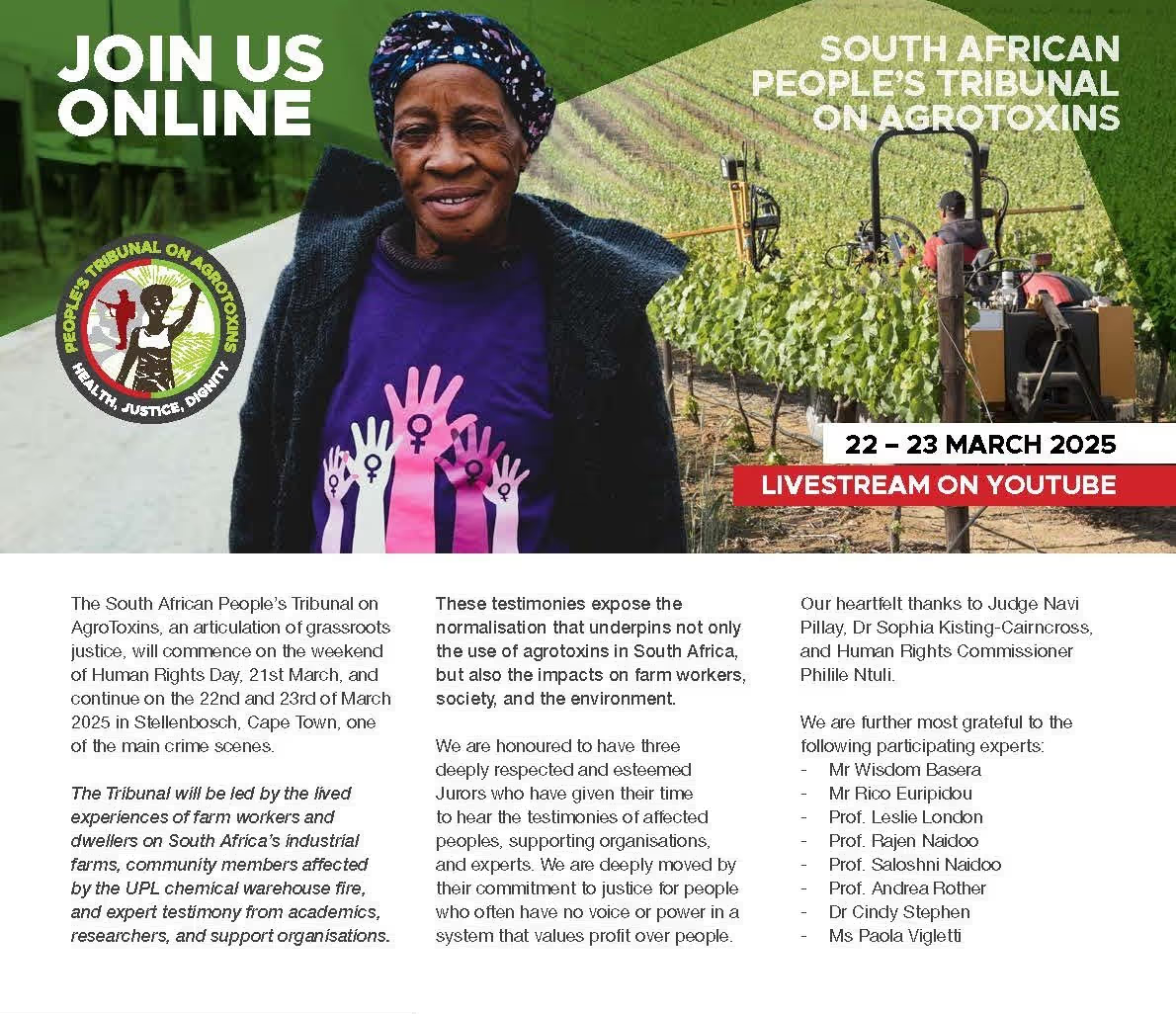
SOUTH AFRICAN PEOPLE’S TRIBUNAL ON AGROTOXINS
By
RLS
The Rosa Luxemburg Foundation is honored to support the South African People’s Tribunal on AgroToxins, a grassroots justice initiative commencing on the occasion of Human Rights Day in South Africa, 21 March, and concluding on 23 March in Stellenbosch, South Africa, the heart of the country’s wine production. This historic event takes place in the heart of the Cape Winelands, home to the country’s most intensive farming operations, where farmworkers and farm dwellers face daily exposure to hazardous pesticides.
The European Union has taken a strong stand against highly hazardous pesticides, banning their use in agriculture within its borders due to their potential to cause severe harm to human health, biodiversity, and the environment. Yet, despite these safeguards for EU citizens, some EU Member States, such as Germany, uphold a double standard by continuing to manufacture these toxic chemicals and export them to third countries, including South Africa. South Africa's 929,000 farmworkers — many of whom are women — navigate the harsh realities of exposure to some of agriculture’s most toxic pesticides, often without sufficient protection or training. The consequences are staggering: globally, acute pesticide poisoning affects an estimated 385 million people annually, compared to 25 million cases in 1990. These exposures have been linked to severe and long-term health issues, including nervous system damage, endocrine disruption, liver and kidney failure, and elevated cancer risks.
For years, farmworkers and their allies in civil society have led peaceful protests and petitions calling for the South African government to ban highly hazardous pesticides (HHPs). In 2022, the Food Sovereignty team of the Rosa Luxemburg Foundation’s Southern Africa Regional Office participated in the first national meeting on agrochemicals, convened by the African Centre for Biodiversity, alongside key partners including the Women on Farms Project and the Commercial, Stevedoring, Agricultural and Allied Workers Union among others, as well as progressive academics, and government officials. This meeting resulted in a coalition demanding stricter regulations and a full ban on highly hazardous pesticides. While South Africa’s Registrar of Act 36 committed to phasing out WHO Class 1a and 1b pesticides (representing the most hazardous) by June 2024, implementation has been delayed, with final phase-out deadlines now extended to 30 June 2025.
A Platform for Justice
The tribunal will amplify the voices of those most affected, featuring testimonies from farmworkers, farm dwellers, and communities impacted by toxic agrochemicals. It will also include insights from academics, researchers, and advocacy organizations, shedding light on South Africa’s entrenched reliance on hazardous pesticides and its consequences for human health, labor rights, and the environment. This is a global issue. Join us online and stand in solidarity with those on the frontlines of pesticide exposure.
The Tribunal will be streamed live! We invite you to join us online in solidarity of this landmark. Watch and support here
Why People’s Tribunals Matter
People’s tribunals have proven to be powerful tools in the fight against impunity, shining a spotlight on hidden injustices, amplifying the voices of those most affected, and demanding institutional accountability. While they lack formal legal authority, their influence in shaping public discourse and driving real-world change is undeniable. For instance, the People’s Tribunal on Economic Crimes in South Africa (2018) played a critical role in laying the groundwork for the State Capture Inquiry, exposing corruption and mobilizing public demand for accountability. On the international stage, the Myanmar People’s Tribunal (2017) was instrumental in supporting legal actions at the International Criminal Court (ICC) and the International Court of Justice (ICJ), advancing the fight for justice and human rights on a global scale. By documenting injustices, galvanizing solidarity, and pushing for systemic reform, people’s tribunals continue to serve as catalysts for transformative change. Be part of the movement for a pesticide-free future. Learn more about the South African People’s Tribunal on Agrotoxins here.



.png)

